The Antares Maelstrom Read online
Page 2
“Thank you, Lieutenant,” Kirk said, tabling any further discussion of the psychology of gold rushes until later. “Put him through.”
“Aye, sir.”
Tilton appeared on the viewscreen, supplanting the live image of the station. He was an older Earthman of British descent with gaunt features and receding silver hair. A simple tan jumpsuit indicated that he was a civilian, reporting to the Federation rather than to Starfleet. Kirk put Tilton in his midsixties, possibly older.
“Sorry to keep you waiting, Captain. I’ve got my hands full, to say the least.”
Kirk noted the weariness in the other man’s voice as well as the puffy circles under Tilton’s eyes. He could tell at a glance that the station manager was overworked and under stress. Tilton was showing definite signs of strain. His shoulders sagged.
“So it appears,” Kirk said. “I appreciate you taking the time to talk to me.”
“No more than I appreciate your arrival,” Tilton said. “To be honest, I’ve been counting the days until you showed up.”
“We’re actually en route to Baldur III,” Kirk reminded him. “But I understand that you’ve requested Starfleet assistance as well?”
“Whatever you can spare, Captain. The situation here is becoming . . . well, untenable.”
“Understood,” Kirk said. “I’d like to beam over and assess the situation firsthand, but the congestion around the station poses a problem. I’m not certain we can get close enough to get within transporter range, so perhaps I should take a shuttlecraft instead.”
“I wouldn’t advise that, Captain. I’m afraid our hangar bay is already packed to capacity. I suppose I could order a civilian vessel to clear room for you, but they’re not going to be happy about it, and tensions are mounting as is.”
Kirk sympathized with the manager’s situation. “No need to put you in an even more difficult position.” A possible solution occurred to him. “Are your transporters working?”
“Overtime,” Tilton said, “but, yes, they’re still fully operational, despite being employed around the clock to transport visiting crews and cargo.”
“Good,” Kirk said. “So we’ll fly a shuttle close enough for you to beam us aboard, leaving a pilot at the helm, of course.”
“That works,” Tilton said, nodding. “I’ll instruct the transporter operators to prioritize your request.” He keyed something into a console. “That’s bound to provoke some grumbling as well, but it’s better than trying to displace a vessel or two.”
“I’ll see you shortly, then. Kirk out.”
Kirk flicked a switch on his chair’s right armrest to end the transmission. Tilton’s image vanished from the viewscreen, restoring the image of the space station. Kirk surveyed the bridge crew, assembling a landing party.
“Spock, Sulu, Chekov, you’re with me.” Kirk glanced at McCoy. “You interested in tagging along as well?”
“If you need me,” the doctor answered, “but I’ve got a whole slate of physicals lined up for this afternoon, plus some routine surgery on Ensign Singer’s busted knee. If you can spare me . . .”
“Tend to your patients, Doctor.” Kirk recalled that Singer had taken a nasty spill down a Jefferies tube earlier that day. “As far as I know, this isn’t a medical emergency.” He activated the ship’s intercom to contact engineering. “Mister Scott, please report to the bridge.”
Scotty could hold down the fort while he checked out the station.
* * *
“Welcome aboard, Captain, officers.”
Tilton met them at the station’s main transporter room, which was located in the central habitation cone. As he stepped off the transporter pad, Kirk noted a long line of people, representing myriad humanoid species, waiting impatiently to be beamed back to their own vessels, while another crowd loitered farther back in a lobby area, perhaps waiting to meet up with some expected new arrivals. Kirk found himself on the receiving end of more than a few scowls and dirty looks from folks who were plainly unhappy about the Starfleet party cutting in line ahead of them. Dissatisfied muttering reached his ears.
Sorry, Kirk thought. Starfleet business.
He introduced Spock and Sulu to Tilton; Chekov had remained at the helm of the shuttle, awaiting their return. He had been instructed to maintain a reasonable distance from the station until summoned back to retrieve the boarding party.
“Thank you for coming, gentlemen,” Tilton said. “We can talk more freely in my office.” He indicated the exit. “If you’ll kindly follow me.”
Only a single security officer accompanied Tilton. “Coming through,” she said, raising her voice to be heard over the general chatter. “Make way, please.”
She cleared a path through the jostling crowd, many of whom took advantage of the situation to vent their frustrations at the station’s manager:
“Tilton! My ship is still waiting to be refueled!”
“What happened to my flight clearance?”
“Why are the Rigelians getting special treatment?”
“The sonic showers on Level Six are malfunctioning again!”
“I’m filing a complaint about you not responding to my previous complaints!”
“What is Starfleet doing here?”
Tilton sported a pained expression as he attempted to fend off the barrage of grievances and questions being thrown at him. Ducking his head and avoiding eye contact, he murmured vague, noncommittal replies.
“Sorry, I’m otherwise occupied at the moment. Please direct your inquiries to my office. The station computer is processing them as fast as it can . . .”
“That’s not good enough, Tilton!” a malcontent bellowed. He was a scruffy-looking, pink-skinned humanoid whose origins Kirk couldn’t immediately place, given how many sentient species were indistinguishable from humans at first glance. His clothing and accent hinted at possibly Izarian roots. “I need to get to Baldur III while the getting’s good!”
More voices, chirps, and growls added to the unhappy chorus. Just as Uhura had reported, things were getting ugly aboard the station. Kirk resisted the temptation to place a hand on his phaser, concerned that might be seen as provocative. Sulu looked to him for direction, clearly worried about the mood of the crowd as well. Kirk discreetly signaled him to let Tilton and his security detail take the lead here.
Let’s play this by ear, he thought. Steady as it goes.
“Please, everyone calm down,” Tilton entreated the discontented travelers. “We’re fully aware of your concerns and are doing our best to address them. As you can see, Starfleet is on hand as well. Please be patient while I sort this out with Captain Kirk and his people.”
“I don’t have time to be patient!” somebody shot back, but Tilton’s appeal seemed to keep matters from boiling over. Or perhaps it was the presence of Kirk and the others that appeased the crowd to a degree. Kirk winced inwardly; he hoped that both Tilton and the frustrated travelers weren’t expecting too much from the Enterprise, which could not stay long before continuing on to Baldur III. There was a limit to how much they could alleviate the crisis.
Exiting the transporter room brought them to a bustling promenade that appeared only slightly less packed than the lobby they had just left. A diverse assortment of sentient species—mammalian, reptilian, avian, amphibian, insectile, and some less immediately identifiable—squeezed past each other as they headed either clockwise or counterclockwise down a wide, curved corridor that, based on Kirk’s familiarity with other deep space stations, probably circled around to meet itself. Automated walkways assisted pedestrians, while antigrav lifters carried assorted luggage, equipment, and storage bins. A babel of voices, vocalizations, and languages tested the station’s automatic translators.
“It appears this so-called fever is not just endemic to humans,” Spock noted.
“More’s the pity,” Kirk said.
He took in the scene as Tilton led them toward his office. Shops and services lined the promenade, offering food, lodging
s, supplies, grooming facilities, information, communications access, entertainment, and other necessities and luxuries. Directional signs indicated the way to the hangar deck, infirmary, cafés, spas, recreational options, and so on. As was standard aboard such stations, some of the facilities were operated by the station, as a public service, while others were commercial operations leasing space on the promenade. The rush toward Baldur III appeared to be a godsend for the local merchants and restaurateurs, although Kirk had to wonder how well they were holding up under this unexpected flood of potential patrons. Too much traffic might almost be more of a hardship than too little. The frenetic ambience reminded him less of a well-ordered space station than of an Argelian bazaar. All that was missing were belly dancers and a fortune-teller or two.
“Talk about a circus,” Sulu said quietly.
“My thoughts exactly,” Kirk said, “and I don’t envy the ringmaster.”
For a circus, however, the scene was definitely lacking in high spirits. Most everyone struck Kirk as in a rush and out of sorts. Baldur III was where the action was; these people wanted in and out of the space station as quickly as possible—and everyone else out of their way.
“Fascinating,” Spock observed. “Alarming, but fascinating.” He surveyed the commotion with detached amusement. “I find myself somewhat grateful that Doctor McCoy stayed behind on the Enterprise. He would no doubt find this venal stampede confirmation of his rather jaundiced view of humanoid nature . . . and I would have difficulty refuting that.”
“Venal is rather harsh,” Kirk said. “These people are just eager to improve their lives, on worlds where a healthy bank account still makes a difference.”
Spock remained dubious. “If you say so, Captain.”
They soon arrived at Tilton’s office, where a diamond-shaped doorway slid open to admit them. The office itself was fairly modest, being only slightly larger than Kirk’s personal quarters back on the Enterprise. Furnishings included a desk, a computer terminal, and a circular meeting table. A viewscreen dominated one wall, while an actual porthole offered a view of the (congested) space around one of the station’s radial arms. A schematic diagram of the station currently occupied the viewscreen. A potted fern, a 3-D backgammon set, a few old-fashioned codex books, and a scale model of the ill-fated U.S.S. Shenzhou provided some personal touches. Microtape disks were piled high atop the desk.
The manager sighed in relief as the door closed behind them, cutting him off from the crowds and their demands. He wiped his brow with a handkerchief.
“You see what I’m up against, gentlemen.”
“I’m getting the general picture,” Kirk said. If nothing else, the brief walk from the transporter room to Tilton’s office had given him a snapshot of conditions aboard the overtaxed station. “You’re essentially a modest roadside inn that suddenly finds itself along a major trade route.”
“That’s one way to put it,” Tilton agreed. “Can I offer you some refreshments? I’m afraid we ran out of genuine coffee some time ago, but I can still muster a synthesized substitute. Or perhaps you’d prefer tea?”
“Tea will do fine,” Kirk said, “and may even be preferable to my companions.”
“Indeed,” Spock stated.
“Tea works for me too,” Sulu said. “Thanks.”
A food slot dispensed the beverages, which Tilton handed out as the men took their place around the table. A triscreen viewer, similar to those found in the Enterprise’s briefing rooms, occupied the center of the table.
“Let me show you the problem in a nutshell,” Tilton said. “Computer: display regional star chart.”
“Displaying,” the computer replied.
A chart of the sector appeared on the viewscreen. Dominating the map was an amorphous, cloud-shaped region of space, delineated in red, which lay directly between the station and the Baldur system. A label identified the highlighted region.
The Antares Maelstrom.
“I assume you’re familiar with the Maelstrom?” Tilton said.
“Not from personal experience,” Kirk answered, “but I know of it. It’s a dangerous region of space that no vessel has ever crossed successfully, due to violent energies and possibly hostile life-forms as well.”
“To be more precise,” Spock said, “the Maelstrom is home to immense, violent currents and eddies of supercharged plasma, whirling at exceedingly high velocities around a heavy mass at its core. The destructive forces at work are such that no vessel or unmanned probe is known to have withstood them long enough to make the crossing. Even obtaining reliable data on conditions within the Maelstrom has proven challenging, due to the difficulty of transmitting signals in and out of the vortex. It is, in many ways, opaque to conventional sensors and communications channels.”
Kirk appreciated the concise summation. He expected nothing less from Spock.
“And no survivors means no firsthand reports on the Maelstrom’s depths?”
“Precisely, Captain.”
“What about the hostile life-forms said to prowl the Maelstrom?”
“Unconfirmed,” Spock said, “and largely conjectural. Theories regarding dangerous entities dwelling within the Maelstrom are largely based on rumors, folklore, and, at best, fragmentary, indistinct, and sadly ambiguous images transmitted by probes shortly before they were destroyed or lost contact with outside observers.” His tone indicated that such reports were to be taken with a sizable grain of salt. “Given that unusual life-forms have been discovered in any number of seemingly inhospitable environments throughout the galaxy, one cannot rule out the possible existence of unknown entities thriving within the Maelstrom, but neither can one assume their existence. It may also be that the Maelstrom’s well-earned reputation for consuming ships has simply spawned legends of lurking menaces lying in wait for unwary travelers.”
Kirk got the idea. “Here there be monsters.”
“Which is not to say,” Spock pointed out, “that all monsters are imaginary.”
As we’ve learned only too well, Kirk thought.
“In any event,” Tilton said, “this station is the last stop before the long detour around the Maelstrom. In the past, we rarely got more than two ships a month, if that. Truth be told, when I accepted the post as manager, I was expecting a rather quiet, low-key job without a lot of excitement or drama, but ever since pergium was discovered on Baldur III . . . well, it’s been anything but.”
“I thought some ships had made it across the Maelstrom,” Sulu said. “Or so I’ve heard.”
“Tall tales and rumors,” Tilton said, waving away such reports. “There are indeed stories about a shortcut through the Maelstrom—the Antares Passage, it’s called—but you’ll never meet anyone who has actually taken it. ‘I knew a fellow who knew a fellow who heard about a ship that made it through in one piece’ . . . that sort of talk. But it’s just a myth . . . and a dangerous one.”
“Dangerous how?” Kirk asked.
“In the present climate, it’s only a matter of time before somebody tries to take a shortcut through the Maelstrom in order to get to Baldur III ahead of the competition. I’ve been doing my best to strongly discourage this, even placing a warning buoy at the border of the Maelstrom, but—”
Before he could say more, the office door slid open and a tall, muscular woman in a navy-blue station security uniform burst in. Her face was sweaty and flushed and her short blond hair disheveled. She had a wrestler’s build, worthy of a Capellan warrior, and a stern, no-nonsense expression. Kirk immediately got the impression that she was not somebody you wanted to get on the wrong side of.
“Sorry I’m late,” she said. “Had to break up an altercation on Level Three.”
“Anything serious?” Tilton asked.
“Nah. Just some pushing and shoving over energy vouchers. My people and I shut it down before it got out of hand.” She shrugged. “The usual . . . these days.”
“A sorry state of affairs, as I was just telling our guests.” Tilton turne
d to introduce the newcomer. “Max Grandle, my head of security.”
“Pleased to meet you,” the woman said gruffly to Kirk and the others. “Don’t get the wrong idea, though. I’ve got things under control.”
“No criticism intended,” Tilton assured Grandle. “It’s not your fault that we lack the resources and personnel to deal with the current crisis.”
“Just saying we’re managing so far,” she insisted. “Security-wise, at least.”
“We’re not here to step on anyone’s toes,” Kirk said diplomatically. “But I imagine you wouldn’t refuse a helping hand or two . . . just until things settle down.”
“I suppose not,” Grandle conceded. “Not trying to get all territorial here. Just wanted to make sure my people get the credit they deserve.”
“Duly noted,” Kirk said.
He considered his options regarding the station’s situation. He couldn’t make gold fever go away or triple the station’s capacity overnight, and like the throngs of fortune hunters overrunning the premises, he also needed to get to Baldur III as soon as possible. Still, it was obvious that the station was seriously shorthanded, and he did have more than four hundred well-trained Starfleet personnel back on the Enterprise. He could probably spare a few dozen crew members for the time being.
“Here’s what I can do,” Kirk said. “I can loan you some of my crew to tide you over until the Federation can provide you with additional personnel of your own. From the looks of it, you need—or could benefit from—additional security, engineering and technical support, and perhaps some medical staff as well?” Kirk asked on McCoy’s behalf, knowing that Bones would raise the issue if he were present. “How is your infirmary coping with the increased traffic through the station?”
“Doctor Trucco and her staff are managing,” Tilton said, “but I’m sure they’d be grateful for some backup as well.”
“I suspected as much,” Kirk said. He couldn’t spare McCoy, but it sounded as though Doctor M’Benga was needed more on this station than aboard the Enterprise for the present, especially with the wide variety of species passing through S-8; M’Benga specialized in xenomedicine. “Let me loan you a doctor and a few nurses as well, if only to ease the load on your own people.”

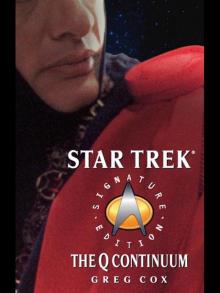 Q-Space
Q-Space Godzilla - the Official Movie Novelization
Godzilla - the Official Movie Novelization War for the Planet of the Apes: Official Movie Novelization
War for the Planet of the Apes: Official Movie Novelization Underworld: Evolution
Underworld: Evolution Underworld
Underworld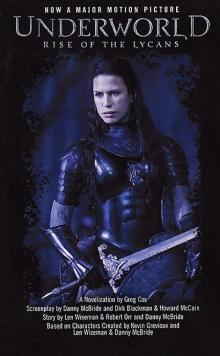 Rise of the Lycans
Rise of the Lycans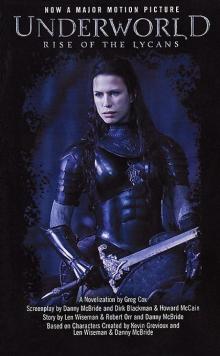 04 - Rise of the Lycans
04 - Rise of the Lycans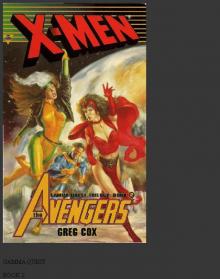 X-Men and the Avengers: Search and Rescue
X-Men and the Avengers: Search and Rescue Child of Two Worlds
Child of Two Worlds Welcome to Promise City
Welcome to Promise City The Librarians and the Mother Goose Chase
The Librarians and the Mother Goose Chase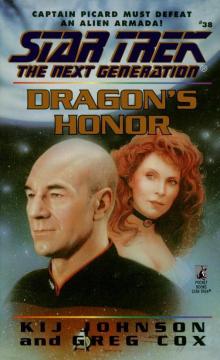 Dragon's Honor
Dragon's Honor 03 - Evolution
03 - Evolution DC Comics novels--Batman
DC Comics novels--Batman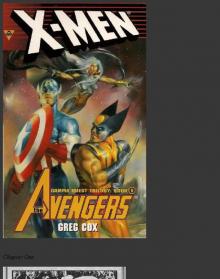 X-Men and the Avengers: Lost and Found
X-Men and the Avengers: Lost and Found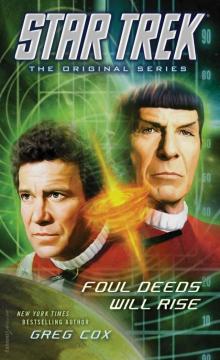 Foul Deeds Will Rise
Foul Deeds Will Rise 02 - Blood Enemy
02 - Blood Enemy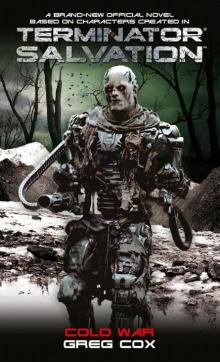 Terminator Salvation: Cold War
Terminator Salvation: Cold War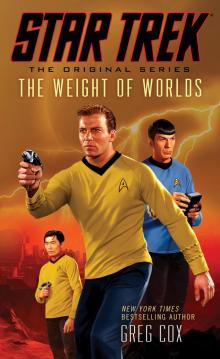 The Weight of Worlds
The Weight of Worlds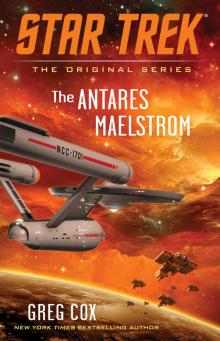 The Antares Maelstrom
The Antares Maelstrom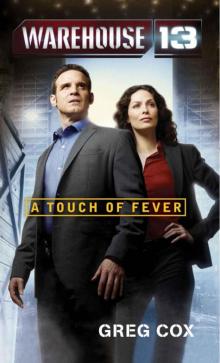 Warehouse 13: A Touch of Fever
Warehouse 13: A Touch of Fever Underworld: Blood Enemy
Underworld: Blood Enemy The Rise and Fall of Khan Noonien Singh
The Rise and Fall of Khan Noonien Singh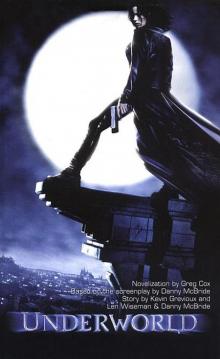 01 - Underworld
01 - Underworld The 4400- the Vesuvius Prophecy
The 4400- the Vesuvius Prophecy Assignment: Eternity
Assignment: Eternity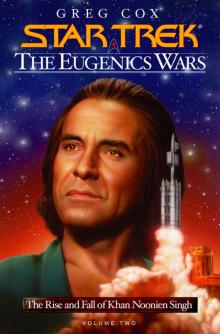 The Eugenics Wars, Vol. 2: The Rise and Fall of Khan Noonien Singh
The Eugenics Wars, Vol. 2: The Rise and Fall of Khan Noonien Singh The Dark Knight Rises: The Official Novelization
The Dark Knight Rises: The Official Novelization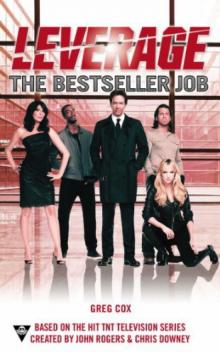 The Bestseller Job
The Bestseller Job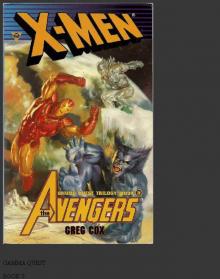 X-Men and the Avengers: Friend or Foe?
X-Men and the Avengers: Friend or Foe?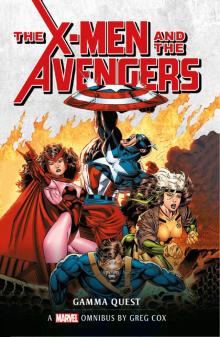 Marvel Classic Novels--X-Men and the Avengers
Marvel Classic Novels--X-Men and the Avengers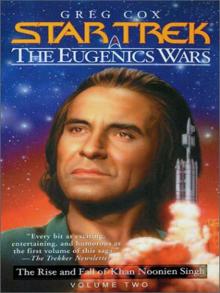 STAR TREK: TOS - The Eugenics Wars, Volume Two
STAR TREK: TOS - The Eugenics Wars, Volume Two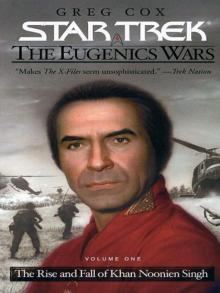 STAR TREK: TOS - The Eugenics Wars, Volume One
STAR TREK: TOS - The Eugenics Wars, Volume One The Black Shore
The Black Shore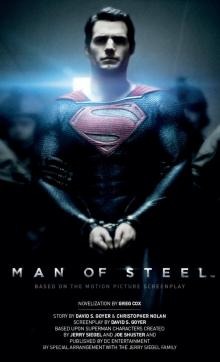 Man of Steel: The Official Movie Novelization
Man of Steel: The Official Movie Novelization Loose ends r-1
Loose ends r-1 Legacies
Legacies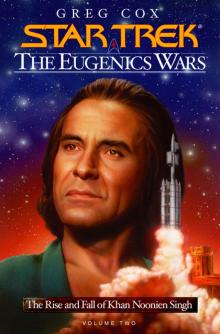 The Eugenics Wars, Volume Two
The Eugenics Wars, Volume Two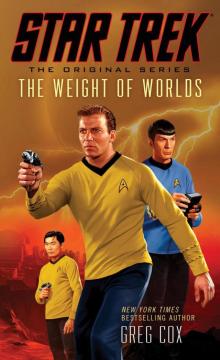 Star Trek: The Original Series - 148 - The Weight of Worlds
Star Trek: The Original Series - 148 - The Weight of Worlds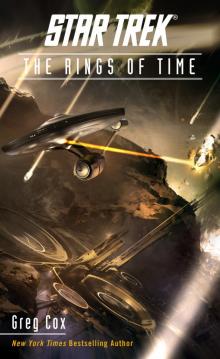 Star Trek: The Original Series: The Rings of Time
Star Trek: The Original Series: The Rings of Time Godzilla--The Official Movie Novelization
Godzilla--The Official Movie Novelization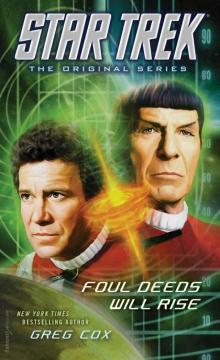 Star Trek: The Original Series - 160 - Foul Deeds Will Rise
Star Trek: The Original Series - 160 - Foul Deeds Will Rise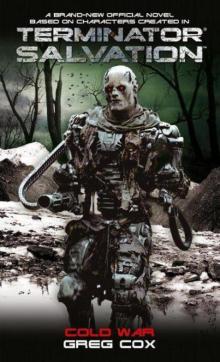 Terminator Salvation: Cold War ts-3
Terminator Salvation: Cold War ts-3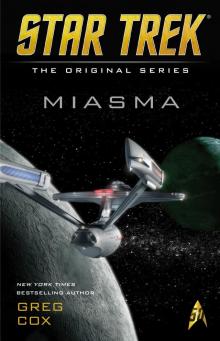 Star Trek: The Original Series: Miasma
Star Trek: The Original Series: Miasma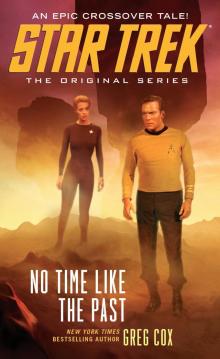 Star Trek: The Original Series: No Time Like the Past
Star Trek: The Original Series: No Time Like the Past Child of Two Worlds (Star Trek: The Original Series)
Child of Two Worlds (Star Trek: The Original Series) THE 4400® WELCOME TO PROMISE CITY
THE 4400® WELCOME TO PROMISE CITY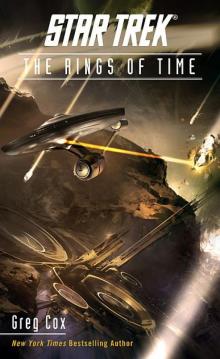 Star Trek: The Original Series: The Rings of Time (star trek: the original series)
Star Trek: The Original Series: The Rings of Time (star trek: the original series) To Reign in Hell: The Exile of Khan Noonien Singh
To Reign in Hell: The Exile of Khan Noonien Singh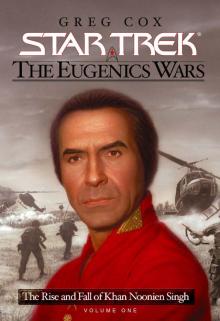 Star Trek: The Eugenics War, Vol. 1
Star Trek: The Eugenics War, Vol. 1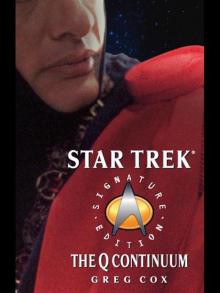 The Q Continuum
The Q Continuum